
WORKAFFAIR
a project
challenging and debating
social and political conceptions
of work



SEMINAR PROGRAM:
10.30 Welcome by organisers Anja Raithel (DK) and Grete Aagaard (DK)
10.35 Introduction by moderators Tone O. Nielsen (DK) and Anja Raithel (DK)
10.50 bankleer, artist group (DE)
Talk: Where work ends and mission begins
Video presentation: Out of work, in with reality!
11.35 Coffee break
11.45 Jens Tonboe, Sociologist (DK)
Talk: Work life Paradoxes
12.30 Lunch
13.15 Kristina Ask, artist (DK)
Talk: What is a professional art worker?
Self-organising and notions of work.
Video presentation: tv-tv coverage of last years EUROMAYDAY Parade in Copenhagen
14.00 Oliver Ressler, artist (A)
Talk and presentation of the film: 5 Factories-Worker Control in Venezuela
15.00 Coffee break
15.15 Kuba Szreder, curator (PL)
Talk: Deindustrialised, Eastern - European town and the questions of work
16.15 – 17.30 Discussion
WORKAFFAIR ILLUSTRATES AND DEBATES ISSUES RELATED TO THE CURRENT VALUE-BASED CONCEPT OF WORK AS WELL AS DIFFERENT STRATEGIES ON HOW TO IMPROVE WORKING CONDI-TIONS AND RIGHTS.
THE SEMINAR ALTERNATES BETWEEN PRESENTATIONS OF ART PROJECTS, TALKS AND DEBATES WITH PARTICIPANTS FROM POLAND, GERMANY, AUSTRIA AND DENMARK.
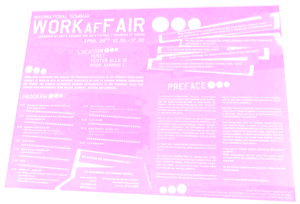
RUM46
project and exhibition space
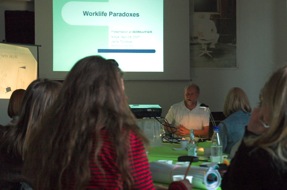
• What happens to the individual and society when the line between work
and spare time is abolished and social life is privatised or institutionalised?
and spare time is abolished and social life is privatised or institutionalised?
• Has the worker assumed the artist's lifestyle and is this necessarily
something to strive for?
something to strive for?
• Is it only paid work that has utility value?
• Which strategies challenge the labour market policy of neo liberalism?
• Have the national union movements played out their roles - what
new (local/global) organising takes place?
new (local/global) organising takes place?
Participants in the seminar:
Sociologist Jens Tonboe (DK), artist group bankleer (DE), artist Kristina Ask (DK),
artist Oliver Ressler (A), curator Kuba Szreder (PL), moderators: curator Tone O.
Nielsen (DK) and Anja Raithel (DK)
Text on the individual participants and organisers - scroll down or open
The participants present eye-opening viewpoints and research, art and exhibition projects, with a point of reference in Danish and foreign work problematics.
With the seminar we aim to debate the current value-based concept of work, where work is mixed with private life - and linked together with empathy, flexibility, freedom, adaptability, creative engagement and self-realisation. All of it positively marketed, whilst at the same time we experience an increased demand on self-support and (self) discipline, more restrictions, and the marginalisation of those outside the labour market.
Sociologist Jens Tonboe will look at some of the paradoxes of working life and question the social consequences of these issues. The artist group bankleer focus on, amongst other things, the uncertainty that the new working conditions bring with them, and how the lifestyle of the artist is sold as a soughtafter work model, and (mis)used in order to justify underpaid work and poor working conditions. Alternative forms of organisation are illustrated from several different perspectives.
Kristina Ask's presentation opens the debate on the self-organisation of the art worker together with the alternative possibilities and limitations of organising oneself across professions. With Oliver Ressler's 5 Factories - Workers Control in Venezuela the focus is shifted to industrial workers in the factories of Venezuela, where new forms of "co-management" and "self management" are appearing.
Kuba Szreder talks about the exhibition project Industrial town futurism, where a number of artists, activists and researchers, investigated various problems connected to the changed conditions for production, labor organisation and working conditions. In Poland the transformation towards a neo-liberal economy has caused large political, economic and social changes with increased inequality and a record low participation in trade unions. Is the goal of common welfare replaced by individualised workfare?
Which consequences can this cause for society's social cohesion and for the possibilities of the workforce organising itself?
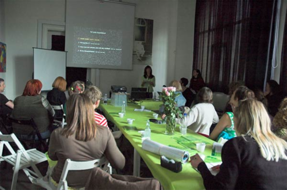
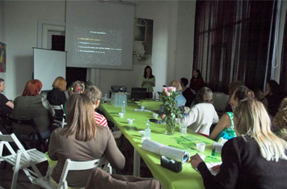

SEMINAR at ‘HUSET’ April 28th 2007




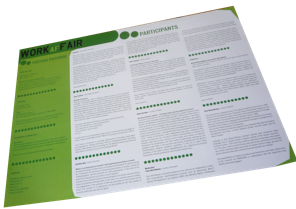
seminar
WORKafFAIR
Texts on the participants in the seminar
bankleer · Artist group, Germany
With performances, docu-fictional videos and the techniques of Expanded Cinema, we create installations on the subject of labor and economic critic. We frequently change contexts, switching between public space and artistic institutions, interweaving political initiatives with artistic actions. We also use activities and performances in order to transform current discourse into practice and to create an active interaction with our audience.
During WORKafFAIR we like to discuss our experiments – attempts at opening up new dimensions in the concept of work by means of artistic intervention. At the beginning of this series of projects is an examination of our own deregulated and “flexibilized” economic situation, one where we are increasingly threatened by the impossibility of pursuing our own artistic work. The precariousness of the life of an artist is currently being marketed as cool and used to justify underpaid work as a new model for society. Necessity is the mother of
invention: The more intense the strain, the greater the innovative force of subjects left to their own devices, left to discipline themselves. Every unemployed person an artist!
Jens Tonboe · Sociologist, Denmark
Worklife Paradoxes
Genuine social change – that is, change in ‘reality’ as well as in our conception of things – is always paradoxical and conflictual. The more important the issue, the more it is so. Our relation to “work” is presently one of the best examples of this. It has been more than a 100 years since ‘industrial modernity’ where the separation between work and free time and between work place and home were delineated and maintained. However, what we have witnessed in the latter part of the 20th century is a regression towards a new integration, which paradoxically, is simultaneously disintegrating the way we live – individually and collectively. Some of the changes are more wilful, others more painful – we often meet this debate in paradoxes as follows:
- decreased individual work time vs. increased collective work time.
- more self realization vs. more self destruction.
- more flexibility vs. more restrictions.
- more market vs. more control.
- etc. etc.
To what extent do such paradoxes make sense in a new work fare paradigm of a new ‘creative knowledge society’? What are the social consequences of this? Jens Tonboe is Professor in sociology, Department of Sociology, Social Work and Organisation, Aalborg University, Editor of: Arbejdssamfundet (The Work Society), 2004. Member of the committee on The Balance between work life and other life for The Danish Council of Technology 2005-06.
Kristina Ask · Artist, Denmark
What is a professional art worker? Self-organising and notions of work An artist receiving a monthly salary including social benefits? An artist running an ”I”-business? On the basis of dominating parametres of ’quality’, notions of ’professionalism’ and the demands for ’self-sustainability’ in the field of art, would it be relevant for art workers to self-organise?
And even more radical to take the step and organise as workers across artistic, social and political working fields on the basis of a common passion toward and engagement in the potential of offering alternatives to the present world order? The question is if organising is at all possible for the role models of flexibility within the new liberal regime.
In the scattered field of no/low-budget projects and research based art, self-organising is yet again becoming a strategy by which to navigate without having to fully accept the logic of capitalism. On the other hand, notions of freedom and autonomy in the art field threatens to limit our movements, actions and thinking if we dare not challenge continuity by for instance talking about feminism as experiences of conflicts and power games with both activism, organising and theory at the core. Does this make us amateurs?
Oliver Ressler · Artist, Austria
5 Factories–Worker Control in Venezuela
Many of Oliver Resslers works are collaborative productions. After working on Venezuela from Below (67mins 2004),Ressler again teamed up with Dario Azzellini to work on 5 Factories-Worker Control in Venezuela (81mins 2006). Here, they captured the changes in Venezuela's productive sphere and use as locations, five large companies in various regions: a textile company, aluminum works, a tomato factory, a cocoa factory, and a paper factory. In all, the workers are struggling for different forms of co- or self-management
supported by subsidies from the government. The protagonists portrayed at the five production locations present insights into ways of alternative organizing and models of workers' control.
Mechanisms and difficulties of self-organization are explained as well as the production processes. The situation in the five factories varies, but they share the common search for better models of production and life.
Oliver Ressler, born in 1970, is an artist who is doing projects on issues of
racism, genetic engineering, economics, forms of resistance and social
alternatives.
Kuba Szreder · Curator, Poland
Deindustrialised, Eastern – European town and the questions of work The point of reference for my presentation will be the project Industrial town futurism, which took place between 2005 and 2007 in Nowa Huta (steel town in Poland) and Wolfsburg (headquarters of Volkswagen company in Germany).
These planned towns, established in the middle of the XXth century were taken as key examples of the changes that occurred in the central and peripheral societies in relation to the fading of the industrial era. In this interdisciplinary project a wide field of various problems were investigated by a group of artists, researchers and activists – among which the issues connected to the changes in the means of production, labor organization and work conditions were playing an important role. During the lecture, documentation of various art projects referring to these themes will be shown and results of research discussed. The presentation will refer mainly to Nowa Huta, showing as one example of the shifts in the economy and society resulting from the general transformation towards neoliberal capitalism. It will try to show these processes in the wider context, highlighting the role played by the workers movements (like the paradoxical role of polish Solidarnosc).
Moderator
Tone Olaf Nielsen · Curator, Denmark
Tone Olaf Nielsen is primarily known for her work as an independent curator with transnational, interdisciplinary projects such as Democracy When!? Activist Strategizing in Los Angeles (2002) and Minority Report: Challenging Intolerance in Contemporary Denmark (2004). She characterizes her curatorial practice as activist, and her strongly politicized projects explore the possibilities of using the exhibition medium as an activist tool for positive social change.
In the spring of 2005, Nielsen joined forces with independent curator Frederikke Hansen and founded the curatorial collective Kuratorisk Aktion, which in 2006 realized the comprehensive exhibition project Rethinking Nordic Colonialism: A Postcolonial Exhibition Project in Five Acts for NIFCA, Nordic Institute for Contemporary Art. Kuratorisk Aktion is engaged in a critical practice along the lines of race, class, gender, and sexuality and merges feminist, queer, and activist informed approaches in order to produce projects that deconstruct white, Western, heterosexual, male privilege within the present world order by
raising consciousness on the politics of representation.
Organisers
Artist Grete Aagaard and curator Anja Raithel
- both members of the collective non-profit exhibition space rum46 founded
1995 in Aarhus, Denmark.
Grete Aagaards artistic practice and Anja Raithels curatorial practice focus on opening up a space for ethical and aesthetic reflection that is able: to problematize static formations of opinion, to affect the foundation for exclusion and inclusion and to encourage the acceptance of differences. Together we have been investigating conceptions of work as related to power, freedom and community and conceptualized the project WORKafFAIR.
WORKafFAIR is based in rum46. The exhibition space is run by 9 artists and theoreticians. The projects and art practices rum46 presents often focus on social dialogue, communication and action, which put important social and political problems in play. Among long-term projects are: Gæstebud - Feast/Hospitality (2002/2003), Solidarity UNLIMITED? Liberty, Equality, Fraternity (2004/2005), NEOTRIBES (2005) and ROSTA-fenster (2006), which have taken place in public spaces and in rum46.










• How can we challenge the labouR-market policy of new liberalism?
• Can one create a globaliZation
of equality and an international
legal system which protects
employees as well as the UNEM-
ployed on a global scale?
• Have the national union
movements played out their
roles and what new organising
takes place?
• What values and practices
can hold people together?